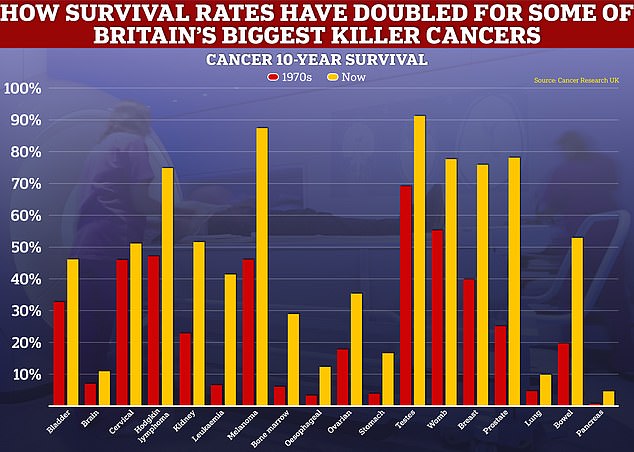Cancer deaths in the UK are set to soar by more than 50 per cent by 2050, world health leaders have warned.
A rising and ageing population – combined with unhealthy lifestyles – are set to fuel a surge in cases.
The World Health Organisation predicts there will be tens of thousands more cases and deaths in Britain each year than previously estimated.
Brits have some of the highest chances of getting cancer on the Continent but fare better than the French and the Danes, the research showed.
However, the data showed patients in the UK are more likely to die from cancer than people in the US.
Experts from the International Agency for Research on Cancer (IARC) and the WHO examined cancer data from 115 different countries, including the UK.
Researchers said there were 454,954 new cases of cancer in the UK in 2022, and this is expected to rise to 624,582 by 2050 – an increase of 37 per cent.
Breast cancer is the most commonly diagnosed cancer in UK women, with prostate cancer the most commonly diagnosed among men, they said.
Lung and bowel cancer are the other cancers most likely to be diagnosed among both men and women.
The IARC and WHO also predicted a sharp rise in the number of deaths from cancer in the UK over the next 26 years, with cases also expected to rise globally.
In 2022 there were 181,807 deaths in the UK due to cancer, they said, and this is expected to rise to 279,004 in 2050 – a 53 per cent increase.
Experts warned officials must act now to mitigate the risk, particularly when it comes to public health strategies.
Dr Panagiota Mitrou, director of research, policy and innovation at the World Cancer Research Fund, said: ‘These new estimates show the increased burden that cancer will have in the years to come.
‘UK governments’ failure to prioritise prevention and address key cancer risk factors like smoking, unhealthy diets, obesity, alcohol and physical inactivity has in part widened health inequalities.
‘We know around 40 per cent of cancers cases could be prevented – now is the time to turn the tide, by implementing policies that enable people to live healthier lives by reducing their exposure to risk factors and prioritising a national cancer plan which includes better screening and early detection.’
Meanwhile, the IARC and WHO said global cancer cases are expected to increase from 20 million in 2022 to 35 million in 2050, a rise of 77 per cent.
The organisations estimate that cancer deaths around the world will almost double from 9.7million in 2022 to 18.5 million in 2050.
Dr Freddie Bray, head of the cancer surveillance branch at the IARC, said: ‘We expect the global population of the world to rise from eight billion in 2022 to almost ten billion by 2050 and this will have a large impact on the number of new cancer cases.’
The IARC and WHO said countries should properly prepare for the rise in cases and deaths.


While the level of progress for cancer survival for some forms of the disease has been rapid, such as for breast and prostate cancers, others, like those for lung and pancreas have only improved at a snail’s pace
Dr Bray added: ‘The impact of this increase will not be felt evenly across countries of different HDI (Human Development Index) levels.
‘Those who have the fewest resources to manage their cancer burdens will bear the brunt of the global cancer burden.’
Dr Cary Adams, of International Cancer Control, said: ‘Cancer treatment outcomes exist not only between high and low-income regions of the world, but also within countries.
‘Where someone lives should not determine whether they live.
‘Tools exist to enable governments to prioritise cancer care, and to ensure that everyone has access to affordable, quality services.’
Michelle Mitchell, Cancer Research UK chief executive, said: ‘This report highlights the international growth in cancer cases and some of the stark health inequalities that affect people in countries across the world, including here in the UK.
‘Everyone deserves access to the best healthcare and Cancer Research UK is committed to supporting global measures to prevent cancer such as tobacco control and HPV vaccination.’










